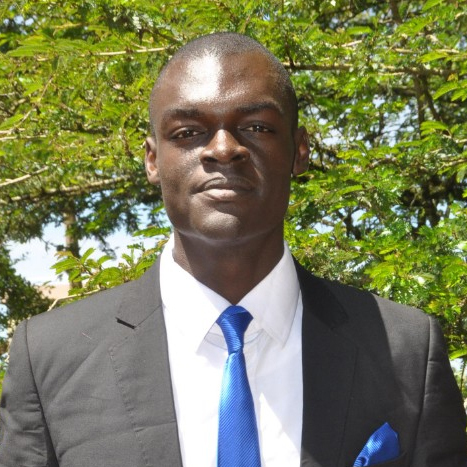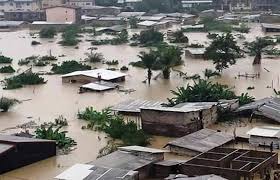How do young people on the African continent experience the COVID-19 pandemic and the consequences of climate change? In this part of our interview series we learn from Ravel Djielon Moutcheu, lawyer and scientist in Cameroon and Daniel Anyorigya, journalist and activist in Ghana. In this way we draw attention to Central and West Africa. Overall, it is not yet possible to predict how the pandemic will develop on the continent (source), but challenges are emerging, e.g. due to the state of the infrastructure in the health system (source 2). It is to be feared that an interaction between the climate crisis and the pandemic will have negative consequences for the population.
“The corona virus is another opportunity to (…) take a resilient stance on climate change. Humanity is living in a particularly delicate phase of its existence.” (Ravel)

Ravel is able to continue working during the pandemic thanks to his home office, but many in his family have lost their jobs 
Daniel is a journalist and activist in Ghana.
Situation before Corona
Klimadelegation e.V.: What was the situation in your country/region like before the Corona pandemic?
Ravel: Regarding climate change, we have to note that Cameroon, despite the measures taken in the energy transition, the promotion of a green economy and the strengthening of reforestation campaigns, was not prepared for the direct effects of climate change. This is due, among other things, to city plans that do not contain the necessary information, unofficial buildings on high-risk land, difficulties in accessing vital resources, the lack of environmental awareness, problems with plastic waste management, shortcomings in the sewage system, etc.
The effects of climate change are already evident in Cameroon. These include constant flooding in the country’s major cities (e.g. in Douala), landslides (e.g. in Gouache), and poor harvests due to climatic conditions. In addition, climate change has an indirect effect and air pollution has a direct impact on the health of the people of Cameroon, which is particularly worrying in view of the Covid-19 pandemic. This also applies to my personal health.
Daniel: In the realm of climate change and agriculture, the Ghanaian government has introduced flagship programmes over the past three years to address the country’s food insecurity, water shortages and unemployment. However, the smuggling of agricultural inputs and the diversion of resources remain problems. In the field of climate change in general, we have seen 22 major hydro-meteorological events in Ghana, affecting 16 million people and causing over 400 deaths. In addition, there have been over 19 major flood events and three major drought events. Five of the climate-related disasters have cost Ghana more than USD 120 million. About climate change and the health sector, it can be said that the National Health Insurance Scheme, a government programme aiming at universal health insurance, has achieved some success by increasing the number of beneficiaries. However, it is still indebted to various healthcare providers and pharmaceutical companies.
The health sector is understaffed and ActionAid Ghana attributes this to Ghana’s high debt service rate, which makes it impossible for the government to invest in this sector. In summary, climate change affects women and children in particular, and therefore a well-equipped health system that provides security is needed.
Klimadelegation e.V.: How was the political situation before the pandemic?
Ravel: Before the Covid-19 pandemic, Cameroon prepared to host international football tournaments, such as the African Nations Cup. For this purpose, the infrastructure has been built up. On the economic level, the prospects were really encouraging. However, Cameroon still faces many economic and social challenges, such as the ongoing terrorist threat in the north of the country.
Situation during Corona
Klimadelegation e.V.: How did Corona affect you and your families?
Ravel: During the health crisis over Covid-19, the government took measures to combat the virus. They have contributed greatly to strengthening family cohesion and the use and development of the digital technology. In addition, I was able to do a professional internship through home office and continue my scientific research. At the social level, we can observe, among other things, the reduction in social interactions. In addition, several members of my family have become unemployed.

Daniel: My parents were not able to earn an income due to the lockdown and other restrictions. This increased the financial burden on me and my brother. The cost of living rose due to an increase in the price of food. However, the family was fed by other family members.
For me personally, COVID-19 meant that many programs and workshops were cancelled that could have improved my skills and knowledge professionally.
Lessons from Corona — Messages for the Future
Klimadelegation e.V.: What lessons should we learn from the Corona Crisis for fighting the Climate Crisis (collectively and individually) ?
Ravel: The corona virus is another opportunity for humanity to take a resilient stance against climate change. Humanity is living in a particularly delicate phase of its existence. Although it should not be forgotten that the solution lies in implementing the Sustainable Development Goals, there is an urgent need to continue raising public awareness and educating people about climate phenomena. In addition, it is important to promote ecological awareness and make appropriate recommendations for action in order to work towards an ecological balance.
It is no longer a question of a preventive approach, but of concrete actions to implement the goals for sustainable development. To this end, each person should be able to feel the weight of both individual and collective responsibility and to act in favour of this common heritage of humanity in order to ensure the sustainability of life. Public authorities should be able to put the climate issue at the top of the list of priorities for public action. Climate action must be made a political issue, because it is truly a public interest from which no one can depart.
Daniel: Given our current situation, politicians should not politicise the national health insurance system and build up higher spending on the health system to help protect the rights of Ghanaians.
As Youth for Climate Germany e.V. we see that there is still a window of opportunity to limit the interaction between the climate and Covid-19 pandemic through global solidarity. If you would like to learn more about the interaction of the crises in general, please feel free to visit our blog post.
Editor’s note: The interview answers are an edited translation from French or English.